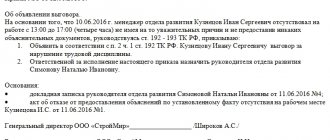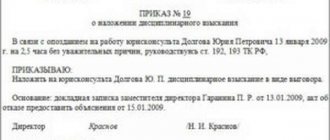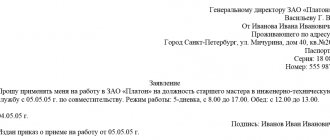Dismissal for being late for work is quite possible under the Labor Code of the Russian Federation.
Our dismissal lawyer will help you sort everything out; you just need to leave a request or call us today.
USEFUL: dismissing an employee without working for 2 weeks as a way to resolve conflict at work
What is lateness according to the Labor Code of the Russian Federation?
If an employee is not present before 4 o'clock , this can be called lateness . If he is gone longer , they talk about absenteeism . However, absenteeism can be counted if the total duration of the shift is less than 4 hours and the delay was only 2-3 hours.
Examples of delays include:
Free legal consultation
+7 800 350-51-81
- absence of the employee at the time when the working day should begin;
- late return after the end of the meal break;
- leaving work early without warning your superiors;
By signing an employment contract, an employee agrees to perform certain duties.
Recording absenteeism or tardiness can be carried out in several ways, for example, according to data recorded in an electronic pass system or physical check of the presence of employees on site . , a report must be drawn up showing exactly who was late and for how long. The employee gets acquainted with the act and draws up an explanatory note in which he describes what caused him to be delayed on the way to work.
The Labor Code of the Russian Federation does not contain the term “lateness”. That is, formally, even a minute delay can be interpreted as a violation of labor regulations. Therefore, managers usually decide for themselves what delay can be considered late.
Often a short delay is allowed , for example, 10-15 minutes. Most often, such delays are not punished: management prefers to limit themselves to a verbal reprimand or warning . Serious penalties may follow if violations of labor discipline occur on a regular basis.
Important! You cannot first reprimand an employee and then fire him as a result of an isolated incident.
How much do you need?
According to the legislation of the Russian Federation, the number of delays after which an employer can fire an employee depends on their duration:
- If a person comes to work ten to fifteen minutes after the start of his shift once, the employer has the right to reprimand him or deprive him of part of his salary. Such an employee can be dismissed only after three similar violations (Article 192 of the Labor Code of the Russian Federation);
- Being late for work by four hours or more is considered absenteeism. For such a violation, the boss can fire the employee immediately, without waiting for the situation to repeat itself (Article 81 of the Labor Code of the Russian Federation).
The company can part with an irresponsible employee the very next day after collecting the commission and signing the corresponding order.
How is it different from truancy?
Each organization has internal rules that stipulate working hours, as well as the period of employment of each employee. If a person does not have a personal schedule, then he must appear at a certain time.
A delay of up to 4 hours qualifies as late. If a person is absent for more than 4 hours, they say that he missed a day of work. Absenteeism can be punished by dismissal - a measure provided for by the Labor Code of the Russian Federation.
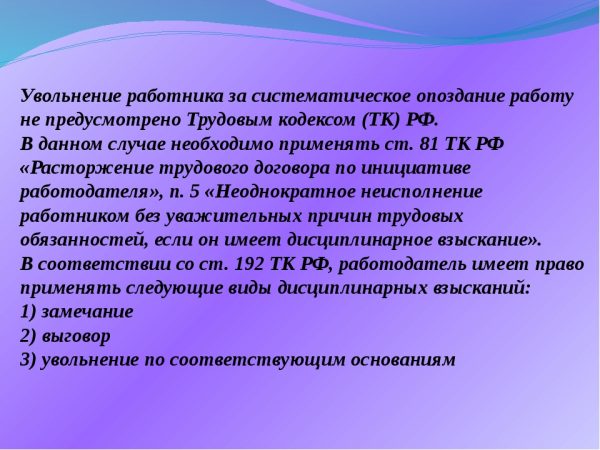
Dismissal for being late for work is considered illegal if it happens once . Dismissal of an employee is possible only if there are systematic delays to work without extenuating circumstances for a long time . According to Article 81 of the Labor Code of the Russian Federation, a decision on dismissal can be made even after a single absence from work without good reason.

As in the case of delay, a truancy report is drawn up. The employee must explain in writing why he did not show up for work. If he refuses this, the manager draws up an act of refusal to provide explanations.
Many tolerant of short delays by employees . But if delays occur too often, penalties .
Is it possible to fire an employee who is constantly late for work?
Definition of lateness according to the Labor Code of the Russian Federation

Lateness is a disciplinary offense by an employee, which involves the absence of a person from his workplace without a valid reason for no more than four hours.
That is, the duration of delay can be determined by the period of absence of the employee at his place of work from one minute to four hours. If this duration is exceeded by the employee, then we will be talking about a serious labor offense - absenteeism.
In enterprises, delays are the most common occurrence. Sometimes they can happen for good reasons. In some companies, small delays (for example, five minutes) may be viewed condescendingly by the administration.
Attention! But if delays are systematic and last a considerable time, their result may be a disruption of the production process in the organization, so management begins to take appropriate measures.
Differences between being late and absenteeism
Both tardiness and absenteeism represent the absence of an employee from his workplace.
However, there is a difference between them:
- The duration of delay cannot be more than 4 hours, and absence of an employee for more than 4 hours is considered absenteeism.
- Lateness is considered a minor disciplinary offense, and absenteeism is considered a serious one.
- For being late, disciplinary action is imposed in the form of a warning and reprimand, and dismissal at the initiative of the employer is possible only when lateness is repeated (more than twice). If an employee skips work, he can be fired immediately for absenteeism.
- Lateness is rarely recorded on the report card. Absenteeism must be reflected in the time sheet using a special code.
What does the law say about dismissal for absenteeism?
An employer, in accordance with the labor code, can hold an employee accountable in the form of dismissal for absenteeism. A serious offense, which includes absenteeism, gives the company administration the right, if necessary, to take appropriate disciplinary measures.
However, the law requires mandatory compliance with the established procedure with the correct execution of all necessary documents.
What penalties are provided?
Due to the fact that failure to show up for work at the start of a shift is not a serious violation, the punishment for it can only be disciplinary:
- remark (in case of a one-time delay);
- reprimand (if there were 2 or more offenses);
- severe reprimand (violations are systematic);
- dismissal (constant delays in the absence of reasons that could be considered valid).
Attention! If an employee can provide evidence that he was unable to arrive at work on time for a serious reason, no disciplinary punishment will be imposed.
Comment
A reprimand is the least severe type of punishment for an employee’s misconduct. It can be expressed either orally or in writing e. A remark is limited if the employee managed to convince his superiors that the reasons for the delay are valid. The reprimand is applied within six months after the incident or within a month from the moment of its discovery.
Rebuke
A reprimand is a more serious punishment than a reprimand. In many workplaces, having multiple reprimands is a good reason to consider dismissal.
The reprimand is displayed in writing in the employee's personal file .
The reprimand is issued according to the following algorithm:
- drawing up the relevant act ;
- receiving a letter of explanation from the employee;
- deciding on punishment. For example, if it is recognized that the reason was valid, and the employee confirms this with documents, no reprimand will be issued;
- drawing up an order to issue a reprimand , familiarizing the employee with the order within three days.
An employee does not agree with the dismissal: where to go?
If an employee is fired, but he does not agree with this event, then it is necessary to act immediately. The fact is that the claim period for dismissal is quite short - only one month. And if you miss it, you can restore it only if there are really compelling reasons.
You might be interested in:
Declaration of conformity with working conditions: deadlines, where to submit, how to fill out
First of all, you need to write an application addressed to the head of the company, to which you must attach copies of supporting documents. This application must be submitted in two copies so that a confirmation mark is placed on the second copy upon receipt.
Next, you need to write complaints to the following authorities:
- Trade union - if an employee is an active member of a trade union, then he cannot be fired without the consent of this body. If this happens, the employee can submit a written application to it, after which the dismissal will be verified. If a violation is detected, the trade union will help file complaints with regulatory authorities.
- Labor Inspectorate - this body must monitor compliance with current labor legislation. A complaint against the employer’s actions can be filed within 1 month from the date of dismissal. Next, the inspector must conduct an unscheduled inspection, and if the violation is confirmed, a fine will be imposed on the organization, and an order will be issued to reinstate the dismissed person in his place.
- The prosecutor's office is another supervisory authority. When filing an application, a prosecutor's inspection is carried out. The positive aspect of such inspections is that if significant violations are discovered, the case materials can be immediately transferred to the court.
- Court - this body can consider a claim for illegal dismissal, but it must be filed within 1 month from the date of the event. If the court sides with the employee, the employer will have to reinstate him in his position, and also, by a court decision, pay monetary compensation (including for moral damage caused).
Can you be fired for being late?
Dismissal is possible if an employee systematically fails to arrive on time or refuses to give an explanation describing the reasons for the delay. An entry is made in the labor stating that the decision to dismiss the employee was made due to the fact that he neglected to comply with the rules of labor discipline.
To avoid dismissal, you must:
- try to warn colleagues or management about the delay;
- prepare documents confirming that the reasons for late attendance at work are valid (certificate from the Housing Office, certificate from a medical institution, etc.);
- As quickly as possible, provide management with an explanatory note describing the reasons for the delay.
Important! If an employee submits false documents that prove a valid reason for the delay, he may be fired and face criminal charges.
Management Notice
To avoid unpleasant consequences, a late employee needs to warn his immediate supervisor about a possible violation of discipline. This measure will help convince the employer of the employee’s responsible attitude towards his work responsibilities. If the reasons for being late are considered disrespectful, then the person can count on the understanding of his superiors and possible exemption from penalties.
When an offense is committed
for a good reason , the employee must not only notify management about it, but also prepare a document confirming the legality of his absence. Immediately after arriving at work, the specialist must notify the boss and provide him with an honest explanation of his behavior (if necessary, in writing). If the facts mentioned by the employee are not true, then the manager can use them as an excuse to terminate the employment relationship due to loss of trust.
Which article of the Labor Code of the Russian Federation is supported by
Penalties that a manager can apply to an employee who frequently violates labor discipline are prescribed in Article 192 of the Labor Code of the Russian Federation. Measures such as reprimands (with or without entry into a personal file), reprimand and even dismissal are expected. According to Article 81 of the Labor Code of the Russian Federation, dismissal can be punished in the event of a single absence from work. However, it is impossible to fire someone for one delay .
What are the consequences of being late?
For one offense there can be only one punishment. 193 Labor Code of the Russian Federation. And it can be applied within a month after the violation is discovered. This period does not include illness, vacation of the employee and the time during which the trade union will express an opinion about the misconduct. If six months have passed since the discovery of the offense, the culprit can no longer be punished.
When the employer detects a delay, he decides what to do. Dismissal is a last resort. Besides it, there are several other not very pleasant options for Art. 192 Labor Code of the Russian Federation.
Comment
The mildest punishment. Usually applied if the offense is minor or the employee committed it for the first time. The employer issues an order to declare a reprimand, which is valid for a year. During this time, the employee is under close supervision. If he deserves a bonus, then the amount may be reduced or not paid at all. Perhaps the remark will be entered into a personal file. All these conditions remain at the discretion of the employer.
The remark may be removed ahead of schedule Art. 194 of the Labor Code of the Russian Federation, if the manager wants it, the superior boss, the trade union or the offending employee himself will ask in writing.
Rebuke
As a rule, this is a punishment for offenses of moderate severity. For example, for being late again. The boss issues an order to issue a reprimand. It can just as easily be withdrawn ahead of schedule. There are no severe reprimands or reprimands entered into a personal file. The Labor Code has one clear wording on this matter. If the employer announced something else, this is a non-existent penalty, for which the head of the station himself will be responsible. 5.27 Code of Administrative Offenses of the Russian Federation.
There is no strict order in the legislation - first there is a reprimand, and then a reprimand. It all depends on the specific violation.
The Labor Code of the Russian Federation stipulates general disciplinary liability. But for some professions there is also a special Commentary on Art. 192 Labor Code of the Russian Federation. Civil servants, railway workers, sailors and some other categories of workers can be involved in it. Punishments for violations are enshrined in the organization's charters and discipline regulations.
How late can one be fired by law?
According to Russian law, an employee can be fired after three absences. Termination of an employment contract is carried out according to a certain algorithm. For the first delay, a reprimand is issued, after which a reprimand follows, and only after the third absence is dismissal possible with a note in the work book “For violation of labor discipline.”
Reference! If the employer considers that the employee’s oral explanations about the reasons for being late and the documents provided by him are sufficient, an explanatory letter may not be drawn up.
Algorithm of actions
If an employee repeatedly violates the rules of labor discipline established at the enterprise, then the employer has the right to end the cooperation on his own initiative, using termination of the agreement as a penalty. The law establishes a procedure for dismissal for being late, and step-by-step instructions will help you carry it out correctly:
- If a violation is detected, it is necessary to draw up an act of violation of internal regulations and certify it with the signatures of three witnesses. They can be the employee’s immediate supervisor, a specialist from the enterprise’s human resources department, and a colleague of the offending official.
- The employee should be required to provide a written explanation of the misconduct. He is given two working days to provide the document. If at the end of the specified period the explanatory note has not been received, then the employer should draw up a special act documenting the lack of explanation from the employee. A person’s refusal to write a document cannot be considered an independent violation, and therefore imposing penalties for such behavior is unlawful.
- It is necessary to request from the official documents or testimony that will confirm the reasons for the misconduct indicated by him. After reviewing the evidence presented, the employer needs to determine whether the grounds can be considered valid.
- Within a month from the moment the violation is discovered, an order for collection should be issued, and then within three days, subject to signature, it should be familiarized to a specialist. If an employee refuses to sign a document, a corresponding act is drawn up, which is certified by the signatures of witnesses.
- A copy of the order must be placed in the official’s personal file for one year. At the end of this period, the disciplinary sanction is considered lifted, and therefore cannot be taken into account when dismissing for lateness.
- If the employee is late again, then all of the above actions, with the exception of issuing an order, should be repeated in the same order.
- The new order imposes a penalty on the employee in the form of dismissal for violation of labor discipline in accordance with Art. 81 Labor Code of the Russian Federation.
- The employee must be familiarized with the order to terminate the employment contract upon signature. If the employee refuses to sign, then a corresponding mark is placed in the document.
- If the specialist asks for a copy of the order, it must be properly certified and issued.
- A work book, completed in accordance with legal requirements, is issued to the employee against signature on the last day of work. A special note is placed in it indicating that the person was fired due to repeated lateness.
- The final payment is made on the same day. The employee receives a salary for the time worked and a compensation payment for unused annual leave.
- The order to terminate the employment contract is accompanied by documentation confirming that the employer has grounds for dismissing the specialist (acts drawn up on the facts of lateness, comments and reprimands issued, orders for deprivation of bonuses).
The process of completing cooperation must be treated very carefully. Any mistake may become a reason for the employee to challenge the legality of the dismissal, as well as reinstatement through the court.
When delay is not punishable
Responsibilities are performed according to the rules of the employer, who establishes the working regime in the organization. Signing an employment contract is an agreement to comply with labor regulations. If the contract was not signed, it is considered that the employee was not introduced to the rules of the organization, which means that his absence for any period cannot be considered late or absenteeism .
Dismissal is also impossible if it was not possible to document that the employee actually violated the company’s rules and was absent from the workplace.
The application of penalties for systematic absence from work during working hours is not the responsibility of management, but it is not prohibited by the Labor Code of the Russian Federation. The Labor Code of the Russian Federation does not stipulate what reasons for being late can be considered valid. Therefore, the degree of “respect” is determined by the employer himself.
As a rule, valid reasons include those that a person could not influence, for example:
- disruption of public transport, for example, due to an emergency or weather conditions;
- natural disasters;
- sudden deterioration in condition due to illness;
- death or illness of a close relative.
The manager has the right to demand documentary evidence of the reasons for the delay. In this case, you can present a certificate from a medical institution, a recording from a video recorder, etc.
Important! The manager does not have the right to reduce the salary or impose a fine for being late. If this happens, the organization's management can be held administratively liable.
Explanatory letter
An explanatory note is one of the main documents in the foreclosure procedure. It is filed by an employee of the enterprise due to his violation of internal regulations. The document does not have a form approved by law, but it must contain the following information:
- full name of the enterprise;
- last name, first name, patronymic and position of the manager;
- last name, first name, patronymic and position of the employee;
- the title of the document written in the center of the line;
- text with a detailed description of the situation that led to the offense;
- documents indicating that the reasons for being late were valid;
- Date of preparation;
- personal signature of a specialist.
If there are documents that can confirm the existence of a valid reason for the misconduct, they must be attached to the note. In some cases, the information contained in the explanatory note allows the employee to be released from punishment.
Step-by-step instructions on how to fire a late worker
According to Article 192 of the Labor Code of the Russian Federation, a manager does not have the right to fire an employee for being late once. A decision on dismissal can only be made on the basis of repeated violations, provided that evidence of valid reasons for the delays is not provided. Below are step-by-step instructions on how to fire or punish an employee for being late:
- in case of a one-time delay at work, the employee writes a letter to his superiors, in which he describes the reason for his misconduct, attaching documents proving that he was forced to violate discipline;
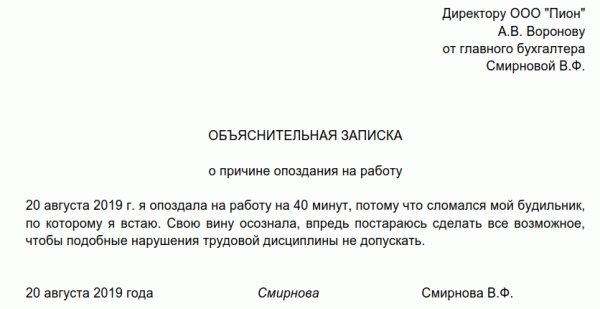
- if an explanatory statement is not provided within 48 hours, a Statement of Refusal of Explanations is drawn up;
- if the employee fails to prove that the reason for the violation was valid, a corresponding act is drawn up and signed by two witnesses;
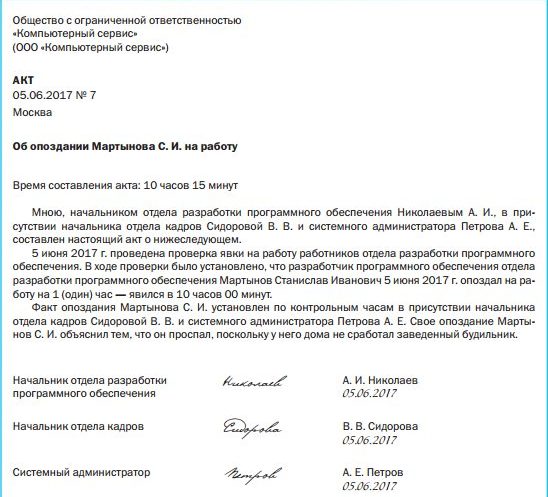
- the manager sets a date for the debriefing, to which all involved are invited;
- after the analysis, an order is drawn up, which reflects the sanctions applied to the latecomer. The manager is obliged to familiarize the employee with this order within three days.
This creates two violations. In the third case, it is possible to fire someone for systematically being late for work, that is, regular violations of labor discipline.
The following mistakes are often made when filing a dismissal:
- the employee is fired after three violations, and there are no documents confirming the first two;
- at least one out of three delays occurred for a valid reason, and the employee provided evidence of this fact;
- more than 12 months have passed between delays;
- the employer summed up the time of all lateness and classified them as absenteeism.
Attention! The employer has the right to apply punishment within six months after the violation. After 12 months, penalties are canceled.
Common mistakes made by employers
An employee may consider his dismissal to be unlawful and seek protection in court. If the employer has fully complied with the requirements of the law, it will not be possible to challenge his decision. However, the court will side with the employee and recognize dismissal for systematic tardiness as unlawful if it turns out that the employer:
- did not properly document previous penalties;
- fired for absenteeism, summing up the time of lateness;
- did not take into account the duration of previous penalties;
- fired for being late for a valid reason.
Read about how much notice you must give about a layoff here.
The consequence of violations committed by the employer will be the reinstatement of the unfairly dismissed employee, as well as payment for his forced absence.
Ask questions in the comments to the article and get an expert answer
If the delay lasts more than four hours in a row
A delay that lasted more than 4 hours is considered absenteeism. Absenteeism is understood as a serious violation of discipline and the employer has every right to dismiss a person even if he does not show up for work once.
Dismissal occurs according to the following algorithm:
- preparation of documents that confirm the fact of misconduct;
- preparing a dismissal order;
- familiarization of the violator with the order. Three working days are given for this .
Reference! Despite the fact that management has the right to fire an employee for absenteeism, in practice this rarely happens. Much more often, management confines itself to a written reprimand. Dismissal occurs in case of repeated violations or if previous disciplinary sanctions do not give the desired result.
Arbitrage practice
A dismissed employee has the right to go to court and demand that the employer's decision be challenged. He must prove that the termination of the employment contract occurred illegally, for example, he was late for reasons that he had no control over and has the opportunity to prove it. If the court finds that the dismissal was illegal, the employee must be reinstated.
Attention! Disciplinary punishment can be lifted early if the employee has stopped violating labor discipline and has become more disciplined after the first reprimand.

